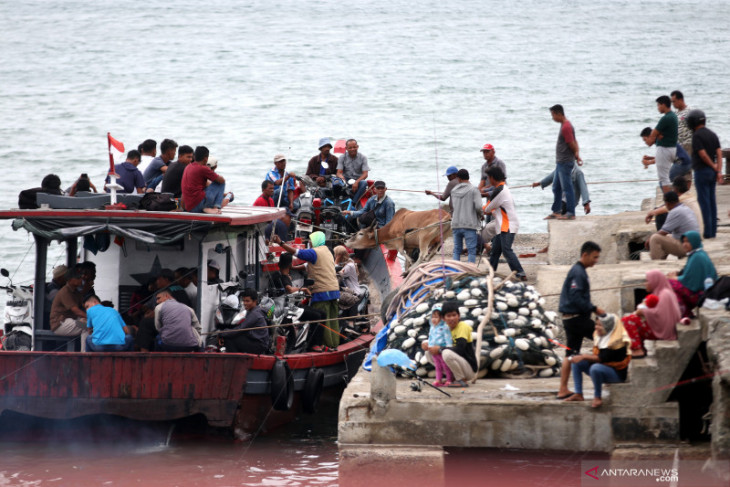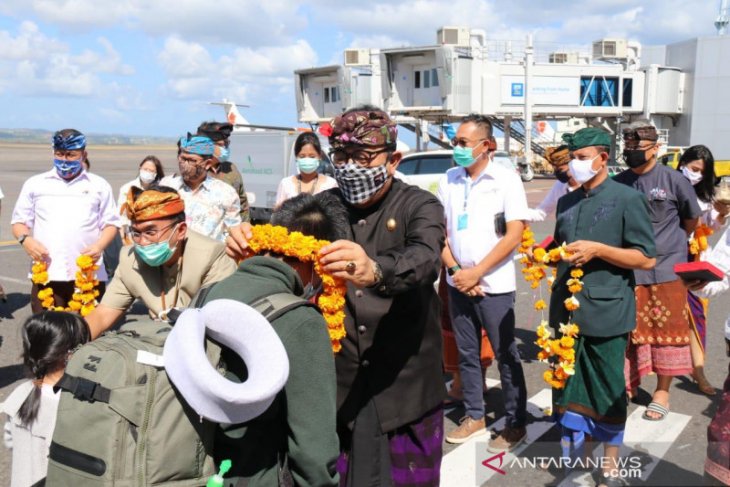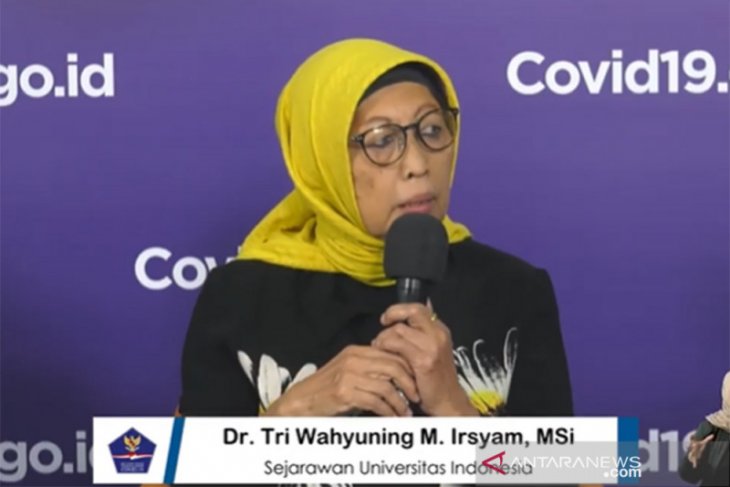Live Streaming
Program Highlight
Company Profile
August
Indonesia Prepares Regulation on Renewable Energy Pricing
Written by Ani Hasanah
A Solar Power Plant (PLTS). ANTARA/HO-PT PLN Public Relations/sh
The Indonesian Government is preparing a presidential regulation on renewable energy pricing, in a bid to gain investors' trust in the clean energy sector.
Director General of Renewable Energy and Energy Conservation (EBTKE) of the Energy and Mineral Resources Ministry Fx Sutijastoto said in a statement in Jakarta on Sunday that the draft of the regulation has been fully supported by business operators in the sector.
"We design this (draft on the presidential regulation) along with businessmen. We communicate and conduct project benchmarking. This is expected to facilitate financing for their businesses," Sutijastoto said.
The draft regulation, he added, is expected to complete before year end.
According to Sutijastoto, the current ministerial regulation has yet to successfully stimulate the signing of new contracts in renewable energy projects.
"Therefore, to establish a competitive climate, the renewable energy price will be regulated under the presidential regulation. This is important," he said.
The development of renewable energy has become a challenge for the country with the high purchasing price of the energy has made it uncompetitive.
He took the example of solar energy price in Indonesia that has reached US$1 per watt peak (Wp), while the price in China has reached as low as $20-30 cent per Wp with production capacity of 500 MW to 1,000 MW.
"Hopefully with the presidential regulation, our market can develop further," he continued.
The development of renewable energy will bring many benefit for the nation, including the production of clean energy, affordable electricity price, and increase national as well as regional investment, Sutijastoto said.
It will also boost the growth of industry and domestic economy, encourage the emergence of new businessmen, and improve national energy resilience.
"The source of energy is abundant in this country, so that we can escape the trade balance trap," he said.
Meanwhile the ministry's Director of Various Energy Harris said the regulation will only set three prices namely feed-in tariff, ceiling price, and negotiated price.
The government would need the support from all stakeholders to synchronize the implementation of the policies, he said. (ANTARA)
August
Significant Surge in Number of Travelers Observed in Idul Adha Holiday
Written by Ani Hasanah I
I
nbound travelers were seen at a seaport in Aceh Province ahead of Idul Adha festivity on July 30, 2020. ANTARA PHOTO/Irwansyah Putra/hp.
The Transportation Ministry recorded a significant increase of travelers using private cars and public transportation modes during the Idul Adha holiday season as observed at several main toll road sections, airports, seaports, bus terminals, and train stations.
The significant surge in both passengers and cars leaving Jakarta's toll road sections heading to those in West Java and Central Java Provinces had been predicted to reach their peak on July 31, the ministry's spokesperson, Adita Irawati, said in Jakarta on Sunday.
This year's Idul Adha holiday season started from Friday amid the ongoing novel coronavirus pandemic situation so that the transportation operators and passengers were required to practice the health protocols' preventive measures, she said.
The significant increase of air passengers at the Soekarno Hatta International Airport in Cengkareng, Banten Province, for instance, was recorded on July 30. On that day, more than 37,000 passengers were served at the airport, Irawati said.
The 16 percent growth of passengers, compared to that of normal days, was also followed by the 13 percent increase in aircraft movements, she said, adding that there were 460 aircraft movements on July 30 or a day prior to the Idul Adha celebration, she said.
The significant surge in air passengers could also be observed at Yogyakarta and Surabaya's airports, she said, adding that the drastic increases in passengers could also be found in the country's inter-provincial railway and ferry services, she said.
The flows of private cars leaving Jakarta's inner ring roads heading to the Trans-Java toll road through the Cikampek section and to the Trans-Sumatra toll road through the Merak Port toll road section also increased significantly, she said.
Some 145,546 cars were recorded to leave several toll road sections in Jakarta on July 29. It equals to an 18 percent increase from that of normal days.
Those traveling by their own cars to enjoy the long weekend of the Idul Adha festivity would get back to the metropolitan areas of Jakarta on Sunday (August 2), Irawati said.
This year, Idul Adha, marking the end of the Hajj pilgrimage for Muslims in the holy city of Mecca in Saudi Arabia, is being celebrated amid the ongoing COVID-19 pandemic.
During this religious festivity, Muslims in Indonesia sacrifice a goat, sheep, and cow. Their meat is then donated to the poor people and other segments of communities.
Coronavirus infections initially surfaced in the Chinese city of Wuhan at the end of 2019.
Since then, COVID-19 has spread to over 215 countries and territories, including 34 provinces of Indonesia, with a massive spurt in death toll.
As of August 1, 2020, Indonesia recorded 1,560 fresh cases, while 2,012 people recovered from the coronavirus disease, according to the COVID-19 Handling Task Force.
The country's tally of COVID-19 cases rose to 109,936, including a total of 67,919 recoveries since President Joko Widodo (Jokowi) made an announcement of Indonesia's first confirmed cases on March 2, 2020.
The number of people succumbing to COVID-19 surged by 62, thereby bringing the death toll to 5,193.
A total of 11,190 specimens from 9,355 people were examined at 320 laboratories across Indonesia on Saturday noon, thereby bringing the total number of specimens examined to 1,517,381 from 875,894 people. (ANTARA)
August
Health Protocols Must be Implemented in Tourist Destinations: Expert
Written by Ani Hasanah
Deputy Governor of Bali Tjokorda Oka Artha Ardhana Sukawati (Cok Ace) welcomed domestic tourists arrived at the I Gusti Ngurah Rai International Airport. (Antaranews Bali/Doc. Bali Provincial Administration/2020)
The government's endeavors to revive Indonesia's tourism sector have won supports from key players of the industry but a Jenderal Soedirman University's expert suggested that tourists consistently practice health protocols to break the chain of COVID-19 pandemic.
To this end, educating both domestic and foreign tourists about the importance of consistently practicing preventive measures mandated in the health protocols was indispensable to enable them to adapt to the new normal, Chusmeru said in Purwokerto, Sunday.
"We need a simultaneous and sustainable education to make the tourists well aware of the importance of such preventive measures as maintaining social and physical distancing measures, wearing face masks, and washing hands," he said.
Reopening tourist destinations in many parts of Indonesia would bring positive impacts on the regions and local people's economy but the revival of various tourism-related businesses should be carried out by respecting the health protocols, Chusmeru said.
"To make sure that the health protocols are implemented, local authorities need to conduct a regular monitoring and evaluation in every tourist destination," he said.
Coronavirus infections initially surfaced in the Chinese city of Wuhan at the end of 2019.
Since then, COVID-19 has spread to over 215 countries and territories, including 34 provinces of Indonesia, with a huge rise in death toll.
This COVID-19 pandemic has become a serious health and economic problem owing to its tremendous impacts on Indonesia's business sectors, including tourism industry.
According to the Jakarta Post quoting data from the Indonesian Hotel and Restaurant Association (July 14, 2020), the coronavirus pandemic has erased around Rp 85 trillion (US$5.87 billion) of Indonesia's tourism revenue.
The coronavirus pandemic has not only disrupted global supply chains but it has also affected aviation service industries owing to the imposition of travel restrictions and border closure in many countries.
As of August 1, 2020, Indonesia recorded 1,560 fresh cases, while 2,012 people recovered from the coronavirus disease, according to the COVID-19 Handling Task Force.
The country's tally of COVID-19 cases rose to 109,936, including a total of 67,919 recoveries since President Joko Widodo (Jokowi) made an announcement of Indonesia's first confirmed cases on March 2, 2020.
The number of people succumbing to COVID-19 surged by 62, thereby bringing the death toll to 5,193.
A total of 11,190 specimens from 9,355 people were examined at 320 laboratories across Indonesia on Saturday noon, thereby bringing the total number of specimens examined to 1,517,381 from 875,894 people.
August
Situation under COVID-19 Pandemic, Spanish Flu Similar: Historian
Written by Ani Hasanah
A screen grab of University of Indonesia historian, Tri Wahyuning M Irsyam, during a virtual dialogue organized by the COVID-19 task force in Jakarta on Saturday (August 1, 2020). (ANTARA/Dewanto Samodro/ac)
Conditions under the COVID-19 pandemic that is plaguing countries around the globe, including Indonesia, bear similarities with those during the Spanish flu of 1918, Tri Wahyuning M Irsyam, a historian from the University of Indonesia, stated.
Speaking about the Spanish flu of 1918 at a talk show broadcast online from Jakarta on Saturday, she said: “(At the time) The colonial government officials routinely drove around in cars to socialize (raise awareness about the) the deadliness of the disease (Spanish flu), (and tell people) that it was better to stay at home, wear masks, and maintain cleanliness.”
Irsyam said these measures were taken by the Dutch East Indies colonial government as not everyone at that time could read the newspaper and obtain accurate information.
The colonial government used direct socialization methods to ensure communities did not underestimate the disease and remained vigilant about the spread of the Spanish flu.
However, the colonial administration and the people held different views on the origin of the Spanish flu, she pointed out.
"The public saw the disease as originating from nature, such as dust, wind, and others. While the colonial government saw the source of transmission as from outside — migrants who were coming in and becoming carriers of the virus," Irsyam elaborated.
She further said that in the early days of the Spanish flu, almost no one was prepared — both governments as well as communities residing in countries across the world. This unpreparedness is evident from the slow handling of the outbreak, she noted.
At the beginning of the outbreak, when some people started to show some symptoms, officials in a number of countries seemed to have ignored the phenomenon, Irsyam stated.
The Dutch East Indies colonial government also responded in a similar manner. When reports of several people falling victim to the flu, including in Bali and Banyuwangi, reached by telegram, they lay at an institution that was administratively equivalent to the state secretariat for months, she added.
"Because there was no response, the colonial government in the area ultimately panicked and left it to the people to act on their own," she explained.
The community eventually put more emphasis on the use of traditional medicine. The Serat Centini mentions several natural ingredients, such as herbs, that were often used in traditional treatments. (ANTARA)


